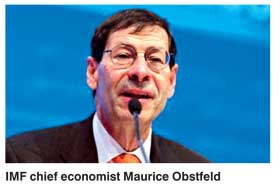Monday Feb 23, 2026
Monday Feb 23, 2026
Thursday, 6 October 2016 00:02 - - {{hitsCtrl.values.hits}}
 Reuters: The International Monetary Fund maintained its forecast for weak global growth on Tuesday and warned that further stagnation will fuel more populist sentiment against trade and immigration that would stifle activity, productivity and innovation.
Reuters: The International Monetary Fund maintained its forecast for weak global growth on Tuesday and warned that further stagnation will fuel more populist sentiment against trade and immigration that would stifle activity, productivity and innovation.
In the latest update of its World Economic Outlook, the IMF said that a drop in U.S. growth for 2016 due to a weak first-half performance would be offset by strengthening in Japan, Germany, Russia, India and some other emerging markets.
The Fund kept its overall global growth forecasts unchanged at 3.1% for 2016 and 3.4% for 2017 after cutting its outlook for five straight quarters.
“Taken as a whole, the world economy has moved sideways,” IMF chief economist Maurice Obstfeld said in a statement.
“Without determined policy action to support economic activity over the short and longer terms, sub-par growth at recent levels risks perpetuating itself.”
The new forecasts were released as economic policymakers gather in Washington for this week’s IMF and World Bank annual meetings amid growing public sentiment against trade and globalization - from Britain’s vote to leave the European Union to U.S. presidential candidate Donald Trump’s threats to levy punitive tariffs on goods from China and Mexico.
The report found that a deceleration in trade liberalisation and an uptick in protectionist policies has contributed to the slowdown in global trade since 2008, which, in turn has weighed on global growth.
The IMF said advanced economies as a whole will see a slight weakening of growth in 2016 to 1.6%, while emerging market economies will see a slight gain to 4.2% growth.
The United States accounts for much of the slowing in advanced economies, with a reduction to 1.6% growth from 2.2% forecast in July, as weak business investment and a drawdown of goods inventories caused a disappointing first-half performance.
Obstfeld applauded the U.S. central bank’s decision to hold interest rates steady in September, and urged it to continue its gradual and data-driven approach to rate hikes, saying inflation was still below the Fed’s target and the U.S. economy was not in danger of overheating.
The IMF’s growth forecast for Japan improved slightly due to government spending, a delay in a consumption tax increase and expansionary monetary policy, but only to a weak 0.5% in 2016 and 0.6% in 2017.
Resilient consumer spending in Britain after the “Brexit” vote prompted the IMF to lift its 2016 UK forecast by 0.1 percentage point to 1.8%, but it lowered its 2017 forecast to 1.1% on anticipation that separation talks over the next two and a half years will take a bigger toll on investment in the country. Growth forecasts for China remained unchanged at 6.6% for 2016 and 6.2% for 2017 as strong policy support and credit growth were fueling domestic consumption, while India’s growth will improve slightly to 7.6% in both years. For a table showing the Fund’s major forecasts and changes by country and region, see.
Obstfeld said that persistently weak growth that leaves lower-income people behind has fueled a political movement “that blames globalization for all woes” and seeks to raise trade barriers.
“In short, growth has been too low for too long, and in many countries its benefits have reached too few - with political repercussions that are likely to depress global growth further,” Obstfeld said.
The IMF said other risks to the outlook included further turbulence from China’s transition towards a more consumer-driven economy, another drop in commodity prices, a sharp hike in trade barriers and a flare-up in geopolitical tensions.